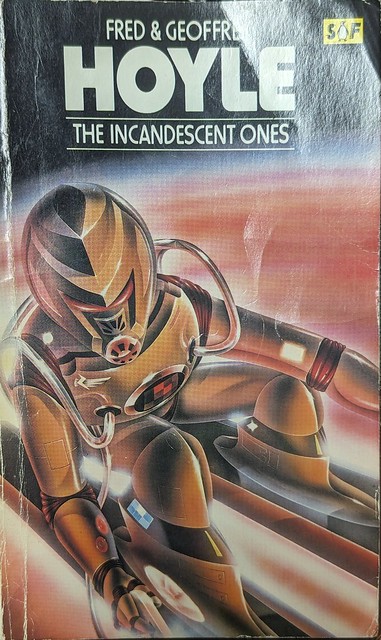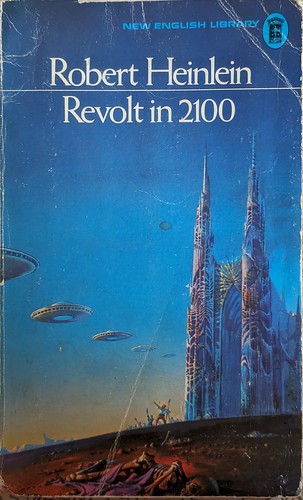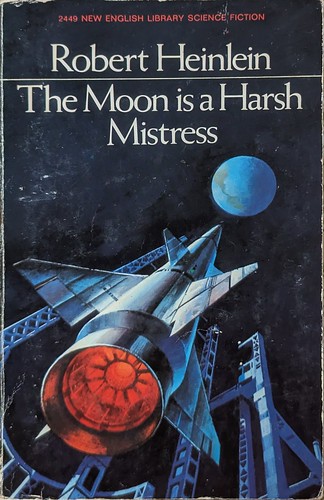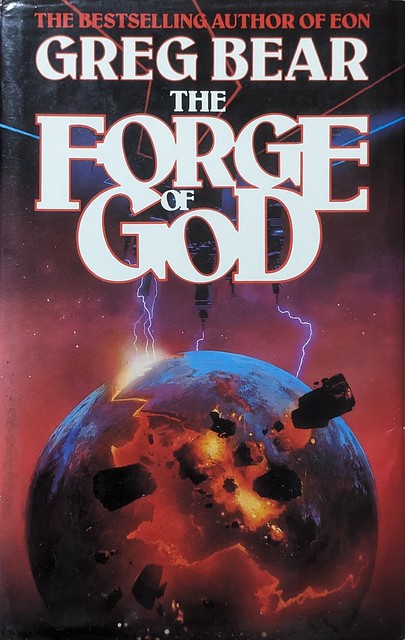
Greg Bear
again. Against my better judgement I bought this from Oxfam on Saturday, and read it quite quickly, but with the expected mounting frustration.
Amusing point: about 2/3 of the way through, the science journo / scifi author re-reads one of his old books, skimming through the makeweight character-building stuff he was obliged to put in, in order to get to the ideas.
The plot: Europa disappears, and then aliens arrive in America to say "I'm sorry there is bad news" and in Australia to say "we're here to help". Investigating this takes up half or more of the book. Eventually it turns out that these are decoys; that the Earth will be destroyed, by special planet-destroying aliens (distinct shades of
Across the Sea of Suns), by a combo of a delayed neutronium - anti-neutronium collision in Earth's core, and a pile of fusion bombs along the mid-atlantic ridge. Meanwhile, helpful aliens turn up and rescue what they can, amidst some poorly-described war-in-the-asteroid-belt between the nice and nasty aliens.
None of this really makes any sense, and feels like multiple ideas got mashed together unfinished.
The initial crashed spacecraft, with the "I'm sorry" alien, is nicely done. The problem is that its a complete waste of time, and goes nowhere. The novel writes it off as a decoy, designed to distract us from forming an effective response; this makes no sense, as we could have no possible response to 100 million tons of neutronium / anti-neutronium. Which, also, feels like massive overkill. And there's no reason why it would be delayed. And that's without the second kill mechanism, whereby ocean water is being split into H and O, and the H being taken for H-bombs, to an extent that the atmospheric O2 level is seen to rise. Which is also massive overkill. Also the first two alien spacehips are found on Earth, having apparently just materialised there inside fake geological features, which makes no sense either: if they were decoys, they would have been seen landing, as spaceships. Other than invoking supa-speshial-tech, none of these things get any kind of how-did-they-do-it explanation.
So much for that. But the human responses don't make sense either. The first crashed space ship is barely examined. One bloke climbs up a tunnel and has a brief look around. That's it. They don't attempt to unbury it from the cinder cone it was found in, or investigate its structure in any way. Perhaps this is because the author knows it is just a fake decoy, and so can't be bothered to write it; or perhaps he has no idea what the spaceship should look like.
There's a sub-plot in which the POTUS goes a bit rogue with religious mania, but all that turns out to be totally irrelevant as the human response doesn't matter a fig, since the destroying aliens are so supa-powerful.
Oh, and Europa: was broken up by the nice aliens, so they could (a) refuel and (b) send 100-km-size chunks off to impact Mars and Venus, thus starting the terraforming process. But... I doubt that would appear as Europa disappearing suddenly; it would more naturally look like... Europa being broken up. My suspicion is that the book started with the Europa disappearing idea, he kept writing hoping to fit it in somewhere, and eventually couldn't. Also there's not a word about the orbits of the other moons of Jupiter being minutely examined for gravitational influences of Europa fragments, which would be the obvious thing to do.
Meanwhile... the book takes the nice aliens at their word as rescuing fragments of Earth (cue now-rather-amusing stacks of CDs representing the Library of Congress; see-also
October the First is Too Late). But the nice aliens' explanation that, very regrettably, they were just a little bit behind the nasty aliens is not very plausible, coincidence-wise. A more parsimonious explanation is only one set of aliens, who wish to destroy Earth and save a bit of it.
The nice aliens have a Law (with a capital letter, so you aren't allowed to question it) that aliens who destroy other alien's planets must be destroyed themselves, even if they've subsequently seen the error of their ways. This seems so desperately heavy handed that I can't wait not to read part two.
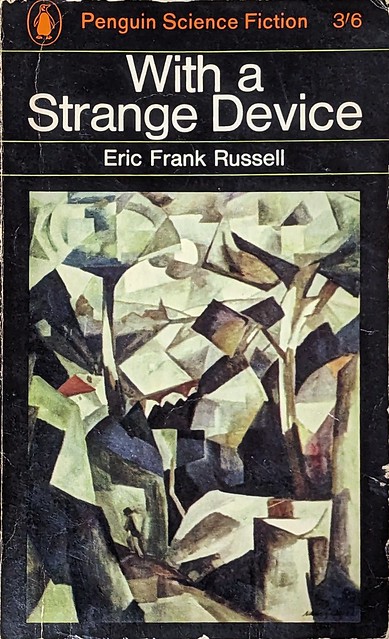 Eric Frank Russell, who I've very vaguely heard of (aah: Wasp). The story starts in a top-secret govt research lab, with a loving description of its many levels of security, and then a fade-out to "but there was a flaw...". Switch to: someone resigning, unexpectedly. Our Hero, discussing this and others who have left recently. And then... Our Hero overhears two worker-types talking, and his repressed memories of killing Arline twenty years ago are triggered. Oh noes, he must run! But he doesn't, quite. In the end (skipping over some tolerably but not very interestingly described detective-y stuff) it turns out that evil Foreigners have devised a machine able to imprint memories, and they have been doing this to knock out govt scientists, thereby crippling the national effort.
Eric Frank Russell, who I've very vaguely heard of (aah: Wasp). The story starts in a top-secret govt research lab, with a loving description of its many levels of security, and then a fade-out to "but there was a flaw...". Switch to: someone resigning, unexpectedly. Our Hero, discussing this and others who have left recently. And then... Our Hero overhears two worker-types talking, and his repressed memories of killing Arline twenty years ago are triggered. Oh noes, he must run! But he doesn't, quite. In the end (skipping over some tolerably but not very interestingly described detective-y stuff) it turns out that evil Foreigners have devised a machine able to imprint memories, and they have been doing this to knock out govt scientists, thereby crippling the national effort. This is OK; indeed, better than the modern average. Reasonably well written, decent starting idea and plot, but a bit pedestrian.
This is OK; indeed, better than the modern average. Reasonably well written, decent starting idea and plot, but a bit pedestrian.  Greg Bear
Greg Bear 